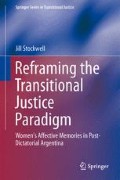Abstract
In this chapter, I consider how decisions about the ways in which memorial culture was created following the return to democratic rule have had crucial implications for the politics of remembering and oblivion for the families of victims of the armed guerrilla movement. The various ways in which the Argentine public sphere has become an arena of struggle over how to remember the political and state violence of the 1970s and 1980s are analysed, as are the group’s subsequent struggles for the political, social, legal and moral recognition of their traumatic memories.
Access this chapter
Tax calculation will be finalised at checkout
Purchases are for personal use only
Notes
- 1.
Other groups’ claims were also omitted. The Commission initially received hundreds of reports from family members about disappearances that occurred prior to the military coup in 1976. However, President Alfonsín baulked at investigating the involvement of the Peronists in the disappearances that occurred in the years leading up to the military takeover. The Commission believed that opening up discussions around responsibilities of the political leadership could trigger a series of cross-accusations that would diminish the legitimacy and impact of the report. Fearing a confrontation with the Peronists, and thus the possibility of diverting attention away from creating a smooth transition to democratic rule, CONADEP’s leader, Sábato, was intent on clarifying that the Commission’s report would be a “report” and not a “black book” that only served to out perpetrators (Crenzel 2008a). The title of the report—“Nunca Más”,or “Never Again”—thus represented a rejection of the dictatorship and a desire to find closure for the historical period being investigated (Jelin 2003).
- 2.
“During the 1970s, Argentina was torn by terror from both the extreme right and the far left” (CONADEP 1986, p. 6).
- 3.
“Subversive” (in Spanish, subversivo) is the term that the political Right gives to describe los desaparecidos.
- 4.
The National Chamber of Criminal Appeal declared that crimes committed by armed guerrilla organisations during the dictatorship did not qualify as crimes against humanity, citing that “what distinguishes crimes against humanity is a crime committed by a government or quasi-governmental organisation against groups of civilians under its jurisdiction and control” (Pagina 12 2011).
Author information
Authors and Affiliations
Corresponding author
Rights and permissions
Copyright information
© 2014 Springer International Publishing Switzerland
About this chapter
Cite this chapter
Stockwell, J. (2014). Politics of Remembering: Armed Guerrilla Violence. In: Reframing the Transitional Justice Paradigm. Springer Series in Transitional Justice, vol 10. Springer, Cham. https://doi.org/10.1007/978-3-319-03853-7_4
Download citation
DOI: https://doi.org/10.1007/978-3-319-03853-7_4
Published:
Publisher Name: Springer, Cham
Print ISBN: 978-3-319-03852-0
Online ISBN: 978-3-319-03853-7
eBook Packages: Behavioral ScienceBehavioral Science and Psychology (R0)

